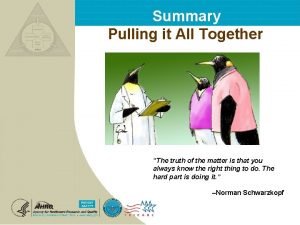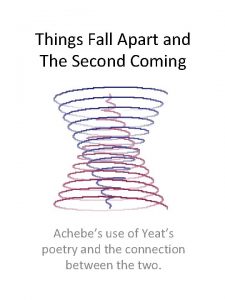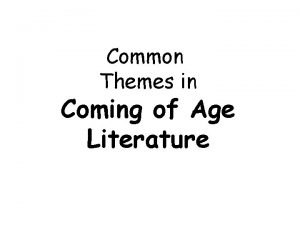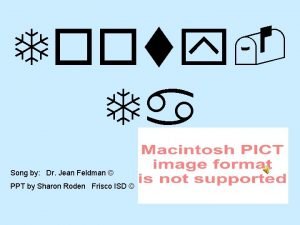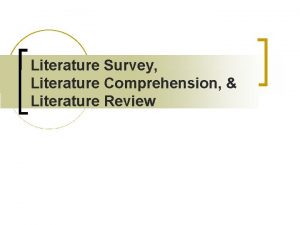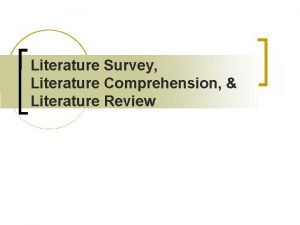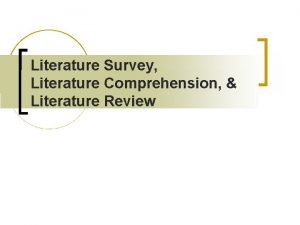Pulling Apart Coming Together Themes of Immigrant Literature












- Slides: 12

Pulling Apart, Coming Together Themes of Immigrant Literature

INTRODUCTION Writing is one response to the forces that create voluntary and compulsory migration. The growing body of Migrant Literature since 9/11 deals with the political as personal and problematizes identity so readers are forced to engage the values not only of their communities and cultures of origin but of nations and

OUTLINE • This presentation will discuss: – Course Objective 5: the social, cultural and historical contexts of the works studied and the forces that push and pull peoples involved in personal or collective migrations – Our selected themes: Reinvention We all have the same needs Hybridity – An explication of Allison Joseph’s “Translating My Parents” – Deconstruction of Urrea’s Father Returns From the Mountain

THEME #1: Reinvention Barakat refers frequently to the refuge writing created in her early years. At the end of Tasting the Sky she uses Alef to symbolize the power of looking beyond a challenge to find new possibilities.

#2 We all have the same needs: • Barakat, Chin and Divakaruni all emphasize our need to be seen for who we are, loved and protected. • Relationships forged by imagination, shared experience or birth can all empower or destroy our sense of who we are (Barakat, p. 56, Chin p. 75, Divakaruni, p. 15).

Hybridity The third way of being that results from the competing forces from one’s former and present cultures.

Explicating a Poem In Allison Joseph’s poem, On Being Told I Don’t Speak Like a Black Person, one understands the challenge of being neither fish nor fowl. The persona in This 1 st person poem is likely to be the author, herself a product of several cultures and linguistic traditions. The speaker admits sounding like neither father nor her mother, and implores her audience to let people reveal themselves in what they say instead of jumping to conclusions about who they are based on how they speak. Now I realize there’s nothing more personal than speech, that I don’t have to defend how I speak… (“On Being Told…” 53 -56),

Theory of Literary Criticism “Deconstruction, in other words, guards against the belief -- a belief that has led to much violence -- that the world is simple and can be known with certainty. It confronts us with the limits of what it is possible for human thought to accomplish” (Stephens, ¶ 5).

Deconstructing Dad In Urrea’s Father Returns From the Mountain…the narrator receives news of his father’s death, buries his father, and then, when the deceased drives by for a visit, breaks the news to his father that he is in fact dead. At least this is what one reads as the action in the story. To begin a deconstruction of the story however, would require the reader to look for the meanings and responses beyond what the author is trying to evoke with his yoking together of the living and the dead.

Are our parents knowable? When I last saw my father, he was in a lot of pain. As a hybrid myself, a 1 st world daughter of a 3 rd world son, I tried to make him smile with this new app. This is how I prefer to remember him. But that would be ignoring much of his “story”, simplifying the complexity of what it means to be a black man, father, son.

Conclusion Deconstruction: A Precondition for Understanding In literature as in life, time and distance make room for deconstructing our origins, our identities, and our shared and possible futures. Suspending the habit of ‘knowing’ creates room for discovery. When we acknowledge the forces that push and pull people together and apart, we participate in a truth greater than ourselves and invite a future worthy of us all.

Works Cited Barakat, Ibtisam. Tasting the sky: a Palestinian childhood. 1 st. New York: Farrar, Straus and Giroux (BYR), 2007. Print. Chin, Staceyann. The other side of paradise: a memoir. 1 st. Boston, Massachusetts: Scribner Book Company, 2009. Print. Divakaruni, Chitra Banerjee. Sister of My Heart. 1 st. New York: Anchor Knopf, 2000. Print. Joseph, Allison. ”On Being Told I Don’t Speak Like a Black Person. " American Diaspora: poetry of displacement. Ed. Virgil Suårez and Ryan Van Cleave. Iowa City: University of Iowa Press, 2001. 224 -225. Print. Peace Through Travel. ”Child Globe Face. " Photo. Ganew-connect. com nd. 15 June. 2011 Stephens, Mitchell. "Jacques Derrida and Deconstruction. " The New York Times Magazine 23 January 1994. 14 June 2011 <http: //www. nyu. edu/classes/stephens/Jacques%20 Derrida%20%20 NYT%20 -%20 page. htm>. Urrea, Luis Alberto. Six kinds of sky: a collection of short fiction. Cinco Puntos Pr, 2002. Print.
 Pulling it all together
Pulling it all together St patrick's college peter skrzynecki
St patrick's college peter skrzynecki Cabrini center for immigrant legal assistance
Cabrini center for immigrant legal assistance Tapestri inc
Tapestri inc This is why people migrate aj+
This is why people migrate aj+ Definiton of social justice
Definiton of social justice An immigrant is someone that is
An immigrant is someone that is Turning and turning in the widening gyre chinua achebe
Turning and turning in the widening gyre chinua achebe Circumscribing stage of a relationship
Circumscribing stage of a relationship Coming together is a beginning
Coming together is a beginning Coming of age themes
Coming of age themes Slides
Slides Thumbs up elbows back song
Thumbs up elbows back song
